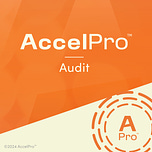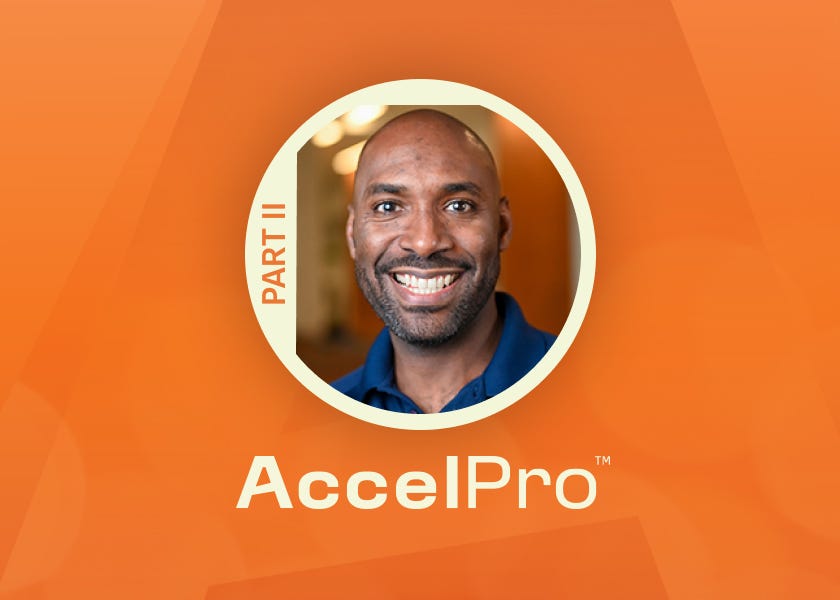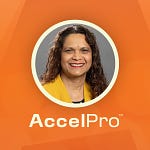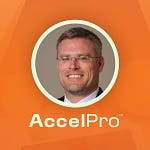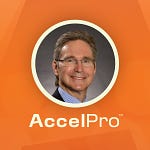Listen on Apple Podcasts, Spotify and YouTube
Welcome to AccelPro Audit, where we provide expert interviews and coaching to accelerate your professional development. Today we’re featuring part II of a conversation with Dr. Damion McIntosh, Professor of Practice Finance in the Harbert College of Business at Auburn University. As the former deputy director of the Jamaican Central Bank’s Bank Regulatory Policy Department, Damion brings a wealth of experience in regulation and supervision to his current role in academia.
His experience in different financial systems in Jamaica, the U.S. and the Caribbean gives him a unique outlook. He’ll share how the audit profession can channel a greater diversity of talent into the field, and why, as an academic, he’s working to expose his students to new opportunities in regulation and supervision.
NOTE: This is Part II of the AccelPro Audit conversation with Dr. Damion McIntosh. Listen to Part I here.
Listen on Apple Podcasts, Spotify and YouTube
Interview References:
Damion McIntosh’s Auburn University profile.
0:58 | Bank of Jamaica.
2:55 | Certified Information Systems Auditor (CISA). Information Systems Audit and Control Association (ISACA).
TRANSCRIPT
I. ON A PROACTIVE APPROACH TO ATTRACTING TALENT IN AUDIT
Alizah Salario, Host: You bring a unique international perspective to the field, but to put it bluntly, audit is not a very diverse field in the US. So my question has two parts. First, do you have any ideas for increasing diversity within the talent pipeline? Second, how do you think increasing diversity of auditors’ identities and perspectives could help the profession?
Damion McIntosh: First of all, the profession has changed when you think of the areas that banks have involved themselves in. Let's look at one of those areas. Banks are getting significantly more technological, which means they’re utilizing evolving and vulnerable technology infrastructure. And so we're not doing just financial audits anymore, we're also doing IT audits. Think of the introduction of the CISA (Certified Information Systems Auditor) certification. What you realize is that the audit profession is not just channeling accounting students or audit students, but they're also channeling the IT student. Audit academic programs or accounting curriculums are now introducing this information technology aspect to better prepare the future set of auditors. That is where diversity becomes extremely important.
The audit profession is expected to be proactive, and not reactive. That’s why we’re looking at where financial institutions will likely position themselves in the future, and developing this pipeline of a new generation of auditors that will eventually grow the profession and make it much more diverse.
I've seen instances where different types of identities are being invited into the profession, either by offering scholarship opportunities or providing internship opportunities, but more of that needs to be done. And part of it is appreciating the experiences that I've had in academia when I speak to my students. Not just students from my university, but also other universities. Non-audit students think audit is boring, but I'll say this to you: at non-financial institutions, students think working in a bank is boring. It's probably not until they take a course and they really appreciate and understand the dynamism that is involved in the profession that it excites them, and makes them passionate to explore the field.
So if we're going to increase diversity, we're going to have to start looking at how we have been channeling talent into the profession, which is through academic programs. That is where it needs to start, in terms of the opportunities that are offered in academic programs to diverse students. Then we need to mentor or groom them into the audit profession by offering opportunities such as internships during academic programs, and then full-time employment. And so when those become feeder programs, a couple of years from now, we’re going to be surprised at how much more diverse the profession will have become.
AS: What drew you to the audit field? Can you think of any pivotal moments or experiences that sent you down this path?
DM: Oftentimes, my students will want to meet with me to find out how I became interested in auditing. I actually started my career in a financial institution that — again, talk about that pipeline — provided my undergraduate scholarship. So I had an internship with this financial institution, and then I received full-time employment there.
So there’s my affinity with financial institutions. I talk about these feeder programs because once you build that relationship with students in an academic program, and they develop this passion for a particular career path, it's easy for them to join the profession full-time after graduation.
Now, here’s the not-so-exciting part. After departing from this financial institution, I worked with one of the big four. I probably would've stuck with it, but at the same time, I received an invitation to work with the Central Bank in Jamaica. You can imagine that in any country, one of the most prestigious organizations you could ever work for is the central bank.
I did well through the recruitment process, and the combination of my audit background and my accounting background (because my undergraduate degree is in accounting) positioned me well in regulation. What you will often find is that there are people who don't really like the accounting side of it, or those who don't really like the finance side of it.
And then you have individuals in the industry who may even be employed with a financial institution, but their perspective is so different that there's not an appreciation for the regulatory aspect. And so with my career as a regulator, I was able to combine all of these skill sets: my accounting background, my audit background, and my PhD, which is also in finance. And so this combination positioned me well, especially on the international stage.
—
II. LARGE AND SMALL FINANCIAL SYSTEMS: PROS, CONS AND THE BEST OF BOTH WORLDS
AS: I would like to hear more about your experience at the Jamaican Central Bank. What was unique about working in that environment?
DM: One of the things that's so unique about working in a financial system that is not the size of the U.S. financial system is that we have a smaller number of financial institutions. That allowed me to focus in different areas of regulation because we were such a small team. It is almost as if we had to spread the work. So I'd work on one particular area of a financial institution in one assessment, and in another financial institution I'd be working in another area. By the end of a two-year span, I'd covered every single aspect of a financial institution, which made me a more wholesome examiner.
Because of the size of the U.S. financial system, you can imagine the size of the regulatory resources that are needed to champion the system. Within the U.S. system, there are greater opportunities for specialization. But what specialization does is that it may pigeonhole you in one particular area of a financial institution. I'm aware of opportunities to cross-train or shift teams, but what that means is, as you navigate through careers in regulation, you don't get a feel for every aspect of a financial institution until an extended period of time, compared to being within a smaller financial system. So I'm extremely grateful for that experience.
I should add that in those smaller systems, however, we do get expertise from larger financial systems. As an examiner working with the Central Bank in Jamaica, I had significant training opportunities with the Federal Reserve, the OCC (Office of the Comptroller of the Currency), and with the equivalent bodies in Canada that came out of the Bank for International Settlements, regional bodies such as ASBA (Association of Supervisors of Banks of the Americas), and the IMF and the World Bank. These organizations provide technical assistance to smaller economies like Jamaica. So I was able to benefit from both worlds: training and expertise from the larger financial system, as well as the intimate knowledge and relationships in my own smaller financial system.
AS: You’re also an advisor with the International Monetary Fund (IMF), and I'm curious about your experience there and how it gives you a unique perspective on regulation and audit.
DM: The awesome position that I'm working in with central banks and countries all over the world allows me to identify so many differences in regulation, in regulatory environments, in types of financial institutions. And that's why I can speak to my experiences between the auditor and regulatory relationship.
In fact, depending on the scope of the work that I do with central banks in countries around the world, it may include meeting with the external audit profession, getting insights into their work, their motivations, and their deliverables to their clients, and sharing the recommendations that I would likely make to central banks and governments around the world. Since they're one of the stakeholders, I’d ask their perspective on any proposed recommendation I intend to make to the central bank, or to the government in that country. The relationship between auditors and regulators appears to be common around the world.
—
III. ON CAREER OPPORTUNITIES IN REGULATION AND SUPERVISION
AS: How did you end up going from regulation and supervision in Jamaica to the world of academia, where you're spending time teaching and researching?
DM: When I worked with the Central Bank in Jamaica, because of the technical assistance offered by the IMF, I would often work alongside and collaborate with the IMF whenever they visited Jamaica or were in need of additional resources when they did some work in the Caribbean.
And so I was always fascinated by the role of the IMF as a global organization providing technical assistance in regulation and supervision to countries around the world. I thought, ‘I would love to do that, but I came from a small country.’ And so I was trying to figure out how to distinguish myself if I wanted to explore an opportunity with an international organization.
I thought one of the best ways to do that is to get the highest possible educational credential, which was a PhD. While pursuing my PhD, I was a graduate teaching assistant. I received not only the Teaching Assistant Award for the College of Business, but also the Teaching Assistant Award for the university.
In 2012, the university at which I completed my PhD invited me to apply where they had a vacancy, and I thought, maybe this is something I could do. Then in 2015, I had the opportunity to work with the IMF on a particular assignment. I guess they liked the work that I did, and offered me the opportunity to work with them as a short-term expert.
So how could I combine my skills and expertise in regulation and supervision with my capacity and passion for teaching? Providing technical assistance through the IMF to countries around the world that need this sort of expertise was my outlet to pursue that. It does give me the opportunity to dabble in both as well, to have my cake and eat it too, so to speak. To be in academia, but not separate from regulation and supervision.
In fact, I should share that this experience caused me to create a new course that I've been teaching here for the past three years or so in financial sector regulation and supervision. It goes back to that same pipeline that we talked about. Many of my finance students, upon graduation, were seeking opportunities directly in financial institutions.
So I’m introducing my students to career opportunities in regulation and supervision. Working with the Federal Reserve or the OCC or the FDIC were paths that they never envisioned, and part of it is because they weren’t necessarily discussed in the classroom as career opportunities. Instead it was discussed in the classroom as the regulatory function for financial institutions. Being able to build that bridge was so important for me. I have guest speakers, for example, from the FDIC and from the Federal Reserve Bank in Atlanta demonstrating to students the work that we do.
It’s creating that pipeline that I mentioned, creating networking opportunities with students to demonstrate the work.
AS: So not only do you get the best of both worlds, but your experience fosters opportunities for others.
DM: Oh, absolutely.
NOTE: This is Part II of the AccelPro Audit conversation with Dr. Damion McIntosh. Listen to Part I here.
This AccelPro audio transcript has been edited and organized for clarity. This interview was recorded on August 21, 2023.
Listen on Apple Podcasts, Spotify and YouTube
AccelPro’s expert interviews and coaching accelerate your professional development. Our mission is to improve your day-to-day job performance and make your career goals achievable.
Send your comments and career questions to questions@joinaccelpro.com. You can also call us at 614-642-2235.
If your colleagues in any sector of the audit field might be interested, please let them know about AccelPro. As our community grows, it grows more useful for its members.



